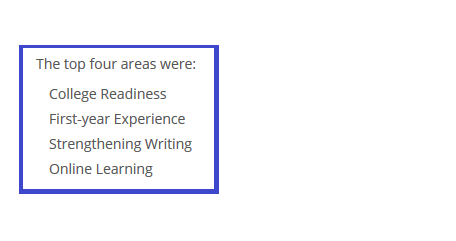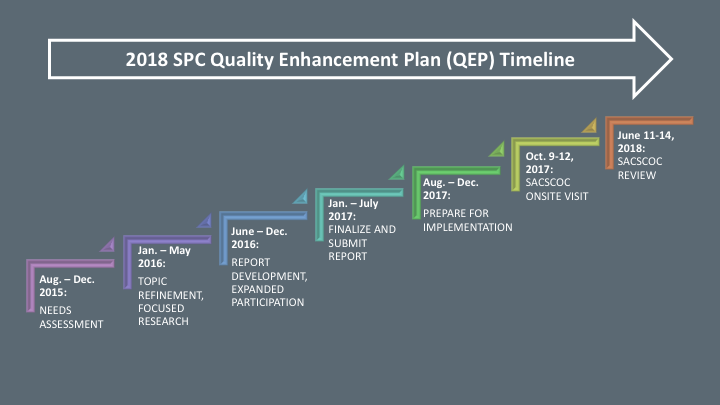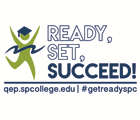- What is a QEP?
- How did we get here?
- What are the goals?
- Who has been involved?
- What's the timeline?
- Implementation Table
According to the Southern Association of Colleges and Schools Commission on Colleges (SACSCOC), a Quality Enhancement Plan (QEP) is:
- A carefully designed course of ACTION.
- Chosen by the college through a collaborative process.
- A well-defined focused topic or issue related to enhancing student learning and/or the environment that supports student learning.
- Focus on one singular topic.
- Include broad-based involvement (including the BOT) in the development and implementation.
Visitors:
After a collaborative lab, the Topic Selection Committee was formed. The goal was to start with seven broad-based areas, and through research, discussions, and surveys, determine the top four:

- First-year experience with cohort-driven learning communities (including mentoring).
- College readiness (ENC1101 and MAT1100/1033).
- Increasing student success in online courses in highest enrollment courses or gateway.
- Strengthening writing for highest enrollment classes (ENC1101, POS2041, PHI1600).
- Faculty engagement in student learning support for degree foundation courses.
- Subsequent critical courses on Pathways success.
- Personal responsibility, social engagement and ethical decision making among students.
From there, we were able to settle on two possible topics:
- College Readiness for Long-term Success : This topic could include many of the ideas related to the possible focus area of the first-year in college experience but could also incorporate support for fundamental skills in math, reading and/or writing through faculty-led learning communities/student cohort groups to include mentoring ideas. This could also include integrated advising, career/transfer & tutoring resources that could be further enhanced with coaching for college success skills in a way that provides students with better study skills, time management strategies, awareness of personal responsibility, and gains in life/school balance. Overall, the goals of this broad-based focus area would be to enhance student learning in critical areas with measurable outcomes that support long-term student success. In addition, a wide range of stakeholders (faculty, staff, students, alumni, and employers) were consulted with and involved in the selection through forums, focus groups, surveys, andinformation sessions. In April 2016 SPC's Board of Trustees approved the College's QEP topic: College Readiness for Long-term Success.
- Strengthening Writing : This topic could include a focus on successful writing in different disciplines rather than just communication courses with the possibility of creating a fabric of support for critical skills for long-term success in writing. Strategies that might be considered would be assigned writing coach for certain classes/groups as a way to integrate writing resources seamlessly in the classroom experience. This broad-based focus area would be to focus on the writing experience through the use of: standard rubrics; plagiarism checks; shared tools for students & faculty; consistent resources as a student progresses along their academic pathway.
College Readiness White Paper PDF
College Readiness in the Online Community PDF
College Readiness through Personal Responsibility and Ethical Decision Making PDF
QEP Strategic Projects SharePoint siteVisitors:
Five components of the QEP framework:
- An Institutional Process: The institution uses an institutional process for identifying key issues emerging from institutional assessment.
- Plan is directly related to institutional planning efforts. Topic selection involved process that generated information and specific ideas from a wide range of constituents. Selection of topic determined by representative process that considered institutional needs and viability of plan.
- A direct and strong relationship of QEP topic to institutional needs; clear how accomplishment of QEP would directly improve institutional/student performance.
- Focus of the Plan: The institution identifies a significant issue that (i) focuses on learning outcomes and/or environment supporting student learning and (ii) accomplishes the mission of the institution.
- Detailed student learning outcomes tied directly to institutional needs.
- A clear relationship between activities of QEP and the improvement of student learning, all tied to established institutional needs.
- Institutional Capability for the Initiation, Implementation, and Completion of the Plan: The institution provides evidence that it has sufficient resources to initiate, implement, sustain, and complete the QEP.
- Very detailed budget information, institutional commitment of funds clearly indicated. If individuals are not yet identified, detailed job descriptions provided that indicate the specific skills and abilities needed for key personnel. Organizational structure shows clear reporting responsibilities and oversight structures.
- Very detailed timetable is provided for year by year activities including specific actions, budgetary expenditures and assessment processes. Timetable indicates clearly that QEP can be realistically implemented and completed in five years.
- Broad-Based Involvement of Institutional Constituencies: The institution demonstrates the involvement of its constituencies in the development and proposed implementation of the Plan.
- Process used ensured input from all relevant constituencies in developing the plan.
- All relevant constituencies have direct involvement in implementation.
- Assessment of the Plan. The institution identifies goals and a plan to assess the achievement of those goals.
- Goals are clearly stated, lead to specific, measurable outcomes.
- Assessment is based on clear outcomes, assessment methods related to outcomes, and are direct measures of those outcomes.
Visitors:
| Implementation Phase 2: | ||||
| Assessment Team | Position | Department | Campus | |
| Ashley Caron** | Assoc. Dir. | Academic Effectiveness | EPI | |
| Carol Weideman | Faculty | Math | Clearwater | |
| Ian Call | Program Director | Collegiate High School | St. Pete/Gibbs | |
| Lynn Grinnell | Faculty | College of Business | EPI | |
| Melanie Paden | Faculty | Communications | Clearwater | |
| Misty Kemp | Director | Retention Services | EPI | |
| Teri Trde | Faculty | College of Health Sciences | HEC | |
| Implementation Team | Position | Department | Campus | |
| Ian Call** | Program Director | Collegiate High School | St. Pete/Gibbs | |
| Melanie Paden | Faculty | Communications | Clearwater | |
| Misty Kemp | Director | Retention Services | EPI | |
| Learning Communities Team | Position | Department | Campus | |
| Carol Weideman** | Faculty | Math | St. Pete/Gibbs | |
| Kari Morrel | Reference & Instruction Librn. | Learning Resources | MT | |
| Kellie Ziemak | Project Coordinator | Student Services | EPI | |
| Mark Strickland | Provost | Provost Office | Seminole | |
| Nikole Jorgensen-Zidar | Instructional Supp. Specialist | Learning Resources | Clearwater | |
| Learner Mindset Team | Position | Department | Campus | |
| Darryl Henderson | Administrative Services Specialist | Online Learning & Services | EPI | |
| Dawn Janusz | Staff | Student Services | HEC | |
| Joe Bowman* | Student | College of Business | Tarpon Springs | |
| Lynn Grinnell | Faculty | College of Business | EPI | |
| Michael Crews | Sr. Instructional Support Specialist | Learning Resources | Tarpon Springs | |
| Misty Kemp** | Director | Retention Services | EPI | |
| Learning Strategies Team | Position | Department | Campus | |
| Lynn Grinnell** | Faculty | College of Business | EPI | |
| Darlene Westberg | Faculty | Computer & Information Technology | St. Pete/Gibbs | |
| Melanie Paden | Faculty | Communications | Clearwater | |
| Michelle Piper | Instructional Technology Manager | Online Learning & Services | EPI | |
| Saunya Talley | Advisor | Student Services | St. Pete/Gibbs | |
| Course Design Team | Position | Department | Campus | |
| Michelle Piper** | Instructional Technology Manager | Online Learning & Services | EPI | |
| Judy Macdonald | Sr. Instructional Support Specialist | Learning Resources | Clearwater | |
| Melanie Paden | Faculty | Communications | Clearwater | |
| Sunita Kamari | Faculty | Social and Behavioral Sciences | Seminole | |
| Susan Benson | Faculty | Communications | Clearwater | |
| Subcommittees: | ||||
| Budget Team | Position | Department | Campus | |
| Heather Roberson | Faculty Chair | CETL | Clearwater | |
| Jennifer Haber | Faculty | Communications | Tarpon Springs | |
| Jesse Coraggio | VP Inst. Effectiveness & Acad. Svc. | Instruction and Academic Programs | EPI | |
| Web Site Team | Position | Department | Campus | |
| Ian Call** | Program Director | Collegiate High School | St. Pete/Gibbs | |
| Marco Capobianco | Technology Support Specialist | CETL | Clearwater | |
| Matthew Bodie | Executive Director | Learning Resources | EPI | |
| Melanie Paden | Faculty | Communications | Clearwater | |
| Video Team | Position | Department | Campus | |
| Basil Mousatsous | Faculty | Humanities/Fine Arts | Clearwater | |
| Christian Moriarty** | Faculty | Ethics | St. Pete/Gibbs | |
| Kathy Siegler | Faculty | Natural Sciences | Clearwater | |
| Marco Capobianco | Technology Support Specialist | CETL | Clearwater | |
| Michelle Piper | Instructional Technology Manager | Online Learning & Services | EPI | |
| Saunya Talley | Advisor | Student Services | St. Pete/Gibbs | |
| Timm Andrews | Project Videographer | Online Learning & Services | Seminole | |
| Information Literacy Team | Position | Department | Campus | |
| Li-Lee Tunceren | Faculty | Communications | Seminole | |
| Matthew Bodie | Executive Director | Learning Resources | EPI | |
| Michael Crews | Sr. Instructional Support Specialist | Learning Resources | Tarpon Springs | |
| Michelle Piper** | Instructional Technology Manager | Online Learning & Services | EPI | |
| Misty Kemp | Director | Retention Services | EPI | |
| Nikole Jorgensen-Zidar | Instructional Support Specialist | Learning Resources | Clearwater | |
| Teri Trede | Faculty | College of Health Sciences | HEC | |
| Marketing Team | Position | Department | Campus | |
| Dawn Janusz | Staff | Student Services | HEC | |
| Joe Bowman* | Student | Business | Tarpon Springs | |
| LaVonda Leonard** | Staff | Leepa-Rattner Museum of Art | Tarpon Springs | |
| Michael Crews | Staff | Learning Resources | Tarpon Springs | |
| Sara Brzezinski | Faculty | Social Sciences | Tarpon Springs | |
| Course Redesign | Position | Department | Campus | |
| Michelle Piper** | Instructional Technology Manager | Online Learning & Services | EPI | |
| Michael Crews | Staff | Learning Resources | Tarpon Springs | |
| Judy Macdonald | Sr. Instructional Support Specialist | Learning Resources | Clearwater | |
| Carol Weideman | Faculty | Math | Clearwater | |
| Melanie Paden | Faculty | Communications | Clearwater | |
| Ashley Caron | Assoc. Dir. | Academic Effectivenes | EPI | |
| Theresa Phoenix | Systems Analyst | Information Systems - AIS | EPI | |
| Online Course Design | Position | Department | Campus | |
| Theresa Phoenix** | Systems Analyst | Information Systems - AIS | EPI | |
| Michelle Piper | Instructional Technology Manager | Online Learning & Services | EPI | |
| Judy Macdonald | Sr. Instructional Support Specialist | Learning Resources | Clearwater | |
| Carol Weideman | Faculty | Math | Clearwater | |
| Ashley Caron | Assoc. Dir. | Academic Effectivenes | EPI | |
| Melanie Paden | Faculty | Communications | Clearwater | |
| Michael Crews | Staff | Learning Resources | Tarpon Springs | |
| Event Planning | Position | Department | Campus | |
| Jennifer Haber** | Faculty | Communications | Tarpon Springs | |
| Doyle Callahan | Systems Analyst, LMS | Online Learning and Services | EPI | |
| Rina Coronel | Faculty, 12 Month | College of Business | EPI | |
| Julia Meyer | Certification Testing Coord. | Career Connections | All State | |
| Melanie Paden | Faculty | Communications | Clearwater | |
| Cynthia Grey | Acting, Associate Dean VetTech | Veterinary Technology | VetTech Center | |
| CARE for Faculty | Position | Department | Campus | |
| Christian Moriarty** | Faculty | Ethics | St. Pete/Gibbs | |
| Stephanie Silvers** | Accessibility Svcs Coordinator | Accessibility Services | HEC | |
| Teri Trede | Faculty | College of Health Sciences | HEC | |
| Rina Coronel | Faculty, 12 Month | College of Business | EPI | |
| Mark Nusspickel | Faculty | Communications | Downtown | |
| Abagail Mills | Adjunct Faculty | Communications | St. Pete/Gibbs | |
| Suzanne West | Coord, Int'l LanguageInstitute | Workforce Institute | EPI | |
| Janice Thiel | Instructional Design Spec | Online Learning and Services | St. Pete/Gibbs | |
| Peer Mentoring | Position | Department | Campus | |
| Ian Call** | Program Director | Collegiate High School | St. Pete/Gibbs | |
| Joe Bowman* | Student | College of Business | Tarpon Springs | |
| Stephanie Silvers | Accessibility Svcs Coordinator | Accessibility Services | HEC | |
| Michael Crews | Staff | Learning Resources | Tarpon Springs | |
| Bryan Sullins | Career & Academic Advisor | Student Services | Downtown | |
| Angela Ashe | Research Analyst | Inst. Research & Effectiveness | EPI | |
| * Student | ||||
| ** Team Lead | ||||
Visitors:

Visitors:
With a goal of each N4S community to reach 30 students, the implementation plan following the pilot year will begin with the existing two campuses but immediately reach out to online students as the third location. The pilot year will allow the RSS! Leadership Committee to enhance the existing program based upon what was learned and focus its attention upon ensuring that online students are able to engage in a similar program during its initial year. After year 1, the plan is to expand college-wide, adding the final three educational locations. By the end of the fifth year, the plan will have supported 870 students.

Visitors:
